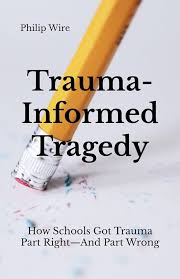A Researched Take on a Nuanced Issue
author Philip Wire on his book Trauma-Informed Tragedy

Well hello there, happy Tuesday!
I told you on Saturday that I was super excited to share this piece with you today, and HERE IT IS! I originally planned for it to be in interview form, but instead, I’m sharing six concise and vital points from one of my favorite nonfiction books of this year: Trauma-Informed Tragedy by Philip Wire.

WAIT! This does matter to you, even if you’re not a teacher OR a parent. The way the next generation is taught and raised matters to EVERYONE in society.
I wrote extensively about this book last spring, and am so happy Philip is here to share some of his main points with my entire audience today ~ no paywall.
What are we talking about? Trauma-informed practices, which rapidly reshaped school culture in the mid-2010s and continue to the present day, focus on restoring relationships and creating a supportive environment rather than issuing consequences for students who break expectations. While this philosophy does have merit, the rushed transition (and incomplete picture painted by its advocates) caused many unforeseen consequences.
Philip Wire is one of the only people I am okay with talking about this ~ he IS a teacher. He HAS done the research. He has lived what I have lived. In my 20 years of teaching I have seen just about everything, and have been through so many cycles of behavior management strategies.
I’m living every day with some of the repercussions of an overreliance on ONLY trauma-informed practices in education, and we need those outside of education to hear a balanced, well-researched, and LIVED take on a hot button issue.
If you aren’t in the education field, before you recoil and say “ummmm, doesn’t MFL also hate trauma-informed practices?”, you need to understand that this is an extremely nuanced issue. Before speaking or taking a stance on this topic, I beg you to read this book.

These are the topics I told Philip I would like him to cover:
1. Impact on teacher well-being of over-reliance on trauma informed practices
2. Impact on OTHER students of over-reliance on trauma informed practices
3. Other causes of unexpected behavior besides trauma
4. Societal solutions to lessen incidents of trauma in children
5. What schools / society actually would need to do to fully address and heal trauma

Philip Wire’s Responses:

1. Asking teachers to shoulder the burden of handling serious disciplinary incidents within their classroom significantly hurt teacher perceptions of well-being. Survey data reports that in addition to the added stresses from COVID, teachers started feeling less safe and supported during the years trauma-informed reforms were taking hold (2015-2024). A popular restorative practices book I analyzed used a case study where a teacher was responsible for handling the entire disciplinary process for two students who got in a prolonged fight, striking the teacher in the process. The students only served a half-day of OSS before the teacher addressed the issue with a restorative circle, and the students returned to class. This model simply did not hold up in the real world, as tragic current events continue to show.

2. The trauma-informed movement also made classrooms less safe and effective for students as a result of these well-meaning reforms. The example above is a perfect illustration: how focused would students be when students who just engaged in a prolonged fight and struck a teacher in class returned the next day, even if restorative practices like a “circle" took place? Restorative justice advocates claimed that by repairing the harm and keeping kids in class, this equitable system would raise academic benchmarks and create more inclusive schools. Instead, disruptive behavior tended to persist or worsen when students were returned to class so quickly. Student well-being surveys from the time report that students felt less safe at school during the time schools rolled out trauma-informed practices.

3. The trauma-informed movement oversimplified all student misbehavior into one question: what traumatic experience has caused this child to feel dysregulated? As a result, schools often attempted to address student behavior in ways that didn’t address real root causes. In the book, I address a few key factors, including dopamine imbalance from increased digital stimulation and declines in mental health protective factors, that have little to do with trauma. There are many ways children’s brains can become dysregulated, but the trauma-informed movement insisted schools emphasize one, often at the expense of others.

4. A given traumatic event will not affect all children equally. Traumatic events that take place during the critical attachment window, from birth to three years old, bear disproportionate weight in brain development. Schools don’t see children at all during this time. If society wants to get serious about lessening the effects of trauma, starting before students ever walk through the school doors is key. Investing heavily in infant and early childhood well-being is where efforts would pay off the most. Trauma-informed works aimed at primary and secondary schools did not fully come to terms with just how difficult it is to reshape the trauma response when the trauma disrupts the formation of a secure attachment during early childhood.

5. Healing trauma is definitely possible: every clinical expert I consulted in my research insisted that it was, and provided powerful examples. However, for an individual to heal from trauma, the limbic system (or downstairs brain) must accept that the world is safe. This must happen through experience, as the amygdala, the pilot of the limbic system, is a pre-verbal part of the brain. Some sort of experiential therapy, under the supervised guidance of a licensed professional, usually offers the best and most consistent results. There is no one-sized-fits-all approach to “fixing” trauma, and every expert I consulted insisted that multiple approaches, even with the same individual, may be necessary. All of that complexity was lost when the trauma-informed movement made its way to schools.

6. Authors in the trauma-informed space didn’t bring receipts. While there were some exceptions, most of the best-selling works advocating trauma-informed and restorative practices did not use proper research protocols. They often used sources like Blogspot and online encyclopedias. One book that stated restorative practices were supported by extensive research did not cite even a single source throughout the entire book. This book sold tens of thousands of copies and was used by schools nationwide for professional development. Claiming that research supports a reform without offering the actual research is a troubling trend in recent school changes, including the trauma-informed movement.

Thanks so much to Philip Wire for joining us here today ~ it was a treat to do a piece like this after not having guest writers for over a year!
Get the book: Trauma-Informed Tragedy by Philip Wire
Also, are you new here? Please do subscribe so you can get my newsletters in your inbox!
My Saturday free A Few Things newsletter is a chatty missive about what I’m reading, doing, thinking, sewing, etc. On Tuesdays, paid subscribers get another full newsletter, and free subscribers occasionally get a newsletter, or a taste of the full one. These are a random assortment of book roundups, musings on the world around us, and often more personal takes / topics I don’t want available on the open internet.
NOTE: Because the internet is a cesspool and today’s newsletter is on a controversial topic, I am opening public comments only to paid subscribers. However, everyone can share their thoughts with me by replying directly to this newsletter.

Add a comment: